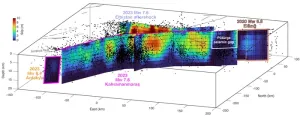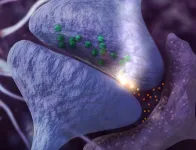(Press-News.org) SAN FRANCISCO — PLOS today announced that PLOS Genetics is expanding the scope of its journal with a renamed section called Microbial Genetics. This section will replace the former Prokaryotic Genetics section to emphasize research on microbes more broadly with the aim to publish studies that use genetic approaches to provide insights into how bacteria as well as archaea and their phages/viruses, fungi (including yeasts and filamentous fungi), and protists function and interact with the biotic and abiotic world.
PLOS Genetics has an established presence in the fungal genetics community, but this research has not easily found a home within its existing journal sections. Currently, the majority of these submissions, primarily studies in yeast, are handled within the General section of the journal. The new microbial section will rectify that issue.
“We believe the new Microbial Genetics section will provide a logical new home for these submissions and reaffirm our continued support for this type of research,” said Gregory Copenhaver, Co Editor-in-Chief, PLOS Genetics.
“We are excited that the relaunch of this section will include a Curated Collection for malaria-related research, which will also include other protozoan parasites,” said Gregory Barsh, Co Editor-in-Chief, PLOS Genetics.
The new section on Microbial Genetics will be headed by Geraldine Butler, Eva Stukenbrock, Lotte Søgaard-Andersen and Sean Crosson. These four section editors are supported by associate editors with broad expertise in microbial genetics.
To learn more about this section relaunch, you can read the editorial here.
###
About the Public Library of Science
PLOS is a nonprofit, open access publisher empowering researchers to accelerate progress in science and medicine by leading a transformation in research communication. Since our founding in 2001, PLOS journals have helped break boundaries in research communication to provide more opportunities, choice, and context for researchers and readers. For more information, visit http://www.plos.org.
About PLOS Genetics
PLOS Genetics publishes human studies, as well as research on model organisms—from mice and flies, to plants and bacteria. Our emphasis is on studies of broad interest that provide significant insight into a biological process or processes. Topics include (but are not limited to) gene discovery and function, population genetics, genome projects, comparative and functional genomics, medical genetics, disease biology, evolution, gene expression, complex traits, chromosome biology, and epigenetics.
END
PLOS Genetics to launch Microbial Section
2023-04-20
ELSE PRESS RELEASES FROM THIS DATE:
Moffitt researchers discover pathway critical for lymphoma development
2023-04-20
TAMPA, Fla. — MYC proteins are important regulators of cancer cell growth, proliferation and metabolism through their ability to increase the expression of proteins involved in these processes. Deregulation of MYC proteins occurs in more than half of all cancers and is associated with poor patient prognosis and outcomes. Numerous researchers have devoted significant efforts to try to target MYC proteins as a therapeutic approach to treat cancer. However, this has been extremely challenging to date, and other complementary strategies are being investigated.
In a new article in Blood Cancer Discovery, which was published simultaneously with a presentation ...
Water arsenic including in public water is linked to higher urinary arsenic totals among the U.S. population
2023-04-20
April 20, 2023-- A new study by researchers at Columbia University Mailman School of Public Health shows that water arsenic levels are linked to higher urinary arsenic among the U.S. population for users of both private wells and public water systems. The findings are published in the journal Environmental Research.
Long-term exposure to arsenic even at low and moderate levels can increase the risk of cancer and other types of chronic disease. While drinking water along with diet is a major source ...
UHN Researchers publish ground breaking clinical trial in lung transplantation
2023-04-20
(Toronto, April 20, 2023) Storing donor lungs for transplant at 10 degrees Celsius markedly increases the length of time the organ can live outside the body according to research led by a team of scientists at the Toronto Lung Transplant Program in the Ajmera Transplant Centre at the University Health Network (UHN).
The prospective multicenter, nonrandomized clinical trial study of 70 patients demonstrated that donor lungs remained healthy and viable for transplant up to four times longer compared ...
Turkey’s next quake: USC research shows where, how bad — but not ‘when’
2023-04-20
Researchers know a lot about Turkey’s next major earthquake. They can pinpoint the probable epicenter, estimate its strength and see the spatial footprint of where damage is most likely to occur.
They just can’t say when it will happen.
That’s the main takeaway from a new USC-led study that appears today (April 20) in Seismica.
Using remote sensing, USC geophysicist Sylvain Barbot and his fellow researchers documented the massive Feb. 6 quake that killed more than 50,000 people in Eastern Turkey and toppled more than 100,000 buildings.
Alarmingly, researchers found that a section of the fault remains unbroken and locked – a sign that the plates there ...
Astrocyte dysfunction causes cognitive decline
2023-04-20
People with dementia have protein build-up in astrocytes that may trigger abnormal antiviral activity and memory loss, according to a preclinical study by a team of Weill Cornell Medicine investigators.
Dysfunction in cells called neurons, which transmit messages throughout the brain, has long been the prime suspect in dementia-related cognitive deficits. But a new study, published in Science Advances on April 19, suggests that abnormal immune activity in non-neuronal brain cells called astrocytes is sufficient to cause cognitive deficits in dementia. The discovery could lead to new treatments that reduce excess immune activity in astrocytes and their detrimental effects on other brain ...
UC Irvine biologists discover bees to be brew masters of the insect world
2023-04-20
Irvine, Calif., April 20, 2023 — Scientists at the University of California, Irvine have made a remarkable discovery about cellophane bees – their microbiomes are some of the most fermentative known from the insect world. These bees, which are named for their use of cellophane-like materials to line their subterranean nests, are known for their fascinating behaviors and their important ecological roles as pollinators. Now, researchers have uncovered another aspect of their biology that makes them even more intriguing.
According to a study published in Frontiers in Microbiology, cellophane ...
Sugar rush: scientists discover key role of glucose in brain activity
2023-04-20
SAN FRANCISCO, CA—April 18, 2023—The human brain has a sweet tooth, burning through nearly one quarter of the body’s sugar energy, or glucose, each day. Now, researchers at Gladstone Institutes and UC San Francisco (UCSF) have shed new light on exactly how neurons—the cells that send electrical signals through the brain—consume and metabolize glucose, as well as how these cells adapt to glucose shortages.
Previously, scientists had suspected that much of the glucose used by the brain was metabolized by other brain cells called ...
New study finds shifting climate regions leading to hotter, drier conditions across Kenya
2023-04-20
ST. LOUIS – Research published in Regional Environmental Change has shown that as climate zones shift toward hotter and drier conditions, ecological diversity will decline, posing a major threat to terrestrial ecosystems with far-reaching social and ecological impacts.
The study, “Shifting climate zones and expanding tropical and arid climate regions across Kenya (1980-2020),” was published online on April 5.
The research team analyzed Kenya's geographic distribution and arrangement of ...
Using solar farms to generate fresh desert soil crust
2023-04-20
In the arid regions of the American Southwest, an unseen world lies beneath our feet. Biocrusts, or biological soil crusts, are communities of living organisms. These industrious microbes include cyanobacteria, green algae, fungi, lichens, and mosses, forming a thin layer on the surface of soils in arid and semi-arid ecosystems.
Biocrusts play a crucial role in maintaining soil health and ecosystem sustainability, but they are currently under assault. Human activities including agriculture, urbanization, and off-road ...
COVID-19 pandemic saw major increase in children and adolescents attempting suicide by poison, study finds
2023-04-20
The rate of suspected suicide attempts by poisoning among children and adolescents ages 10-19 reported to U.S. poison centers increased 30% during 2021 – the COVID-19 pandemic’s first full year – compared with 2019, a new UVA Health study found.
The rate of suspected suicide attempts by poisoning among children ages 10-12 increased 73% during 2021 compared with 2019. Among adolescents ages 13-15, the rate of suspected suicide attempts by poisoning increased 48.8% in 2021 versus 2019. The rate of suspected suicide attempts by poisoning among females ages 10-19 increased 36.8% in 2021 compared with 2019.
The findings ...



